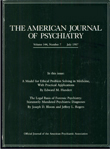Guided Self-Change for Bulimia Nervosa Incorporating Use of a Self-Care Manual
Abstract
OBJECTIVE: The aim of this study was to evaluate the effectiveness of guided self-change for bulimia nervosa. METHOD: Sixty-two patients with DSM-III-R-defined bulimia nervosa were randomly assigned to 1) use of a self-care manual plus eight fortnightly sessions of cognitive behavior therapy (guided self-change) or 2) 16 sessions of weekly cognitive behavior therapy. RESULTS: At the end of treatment and at follow-up an average of 43 weeks after the end of therapy, substantial improvements had been achieved in both groups on the main outcome measures: eating disorder symptoms according to experts' ratings (Eating Disorder Examination subscores on overeating, vomiting, dietary restraint, and shape and weight concerns), self-reports (Bulimic Investigatory Test Edinburgh), and a 5-point severity scale. Also, improvement was seen on the subsidiary outcome measures: the Beck Depression Inventory, the Self-Concept Questionnaire, and knowledge of nutrition, weight, and shape. At follow-up, 71% of the cognitive behavior therapy group had not binged or vomited during the week preceding. In the guided self-change group, 70% had not binged and 61% had not vomited during the week before follow-up. CONCLUSIONS: Guided self-change incorporating use of a self-care manual offers an approach that can be as effective as standard cognitive behavior therapy in the long term and can considerably reduce the amount of therapist contact required. (Am J Psychiatry 1998; 155:947–953)



